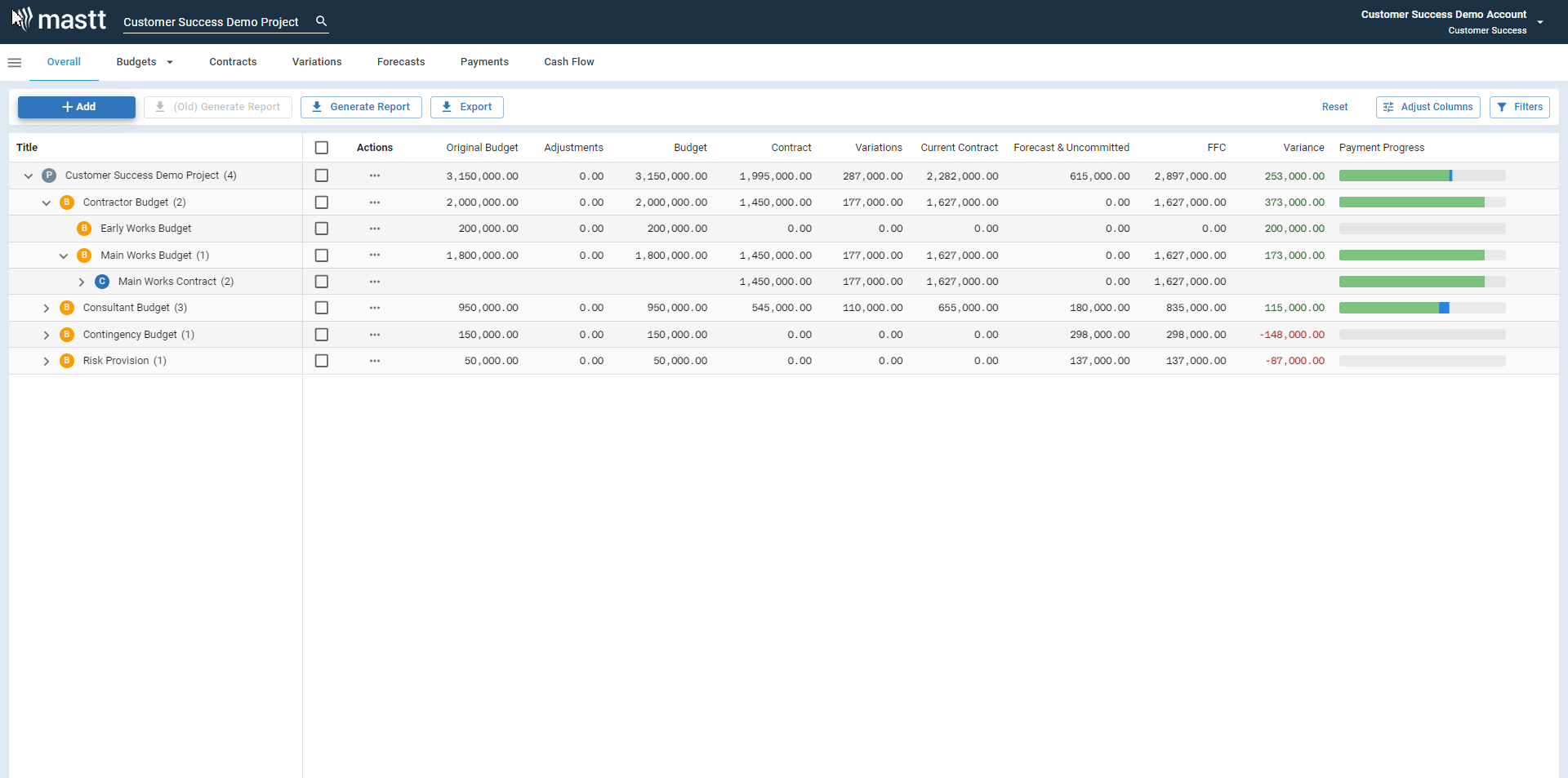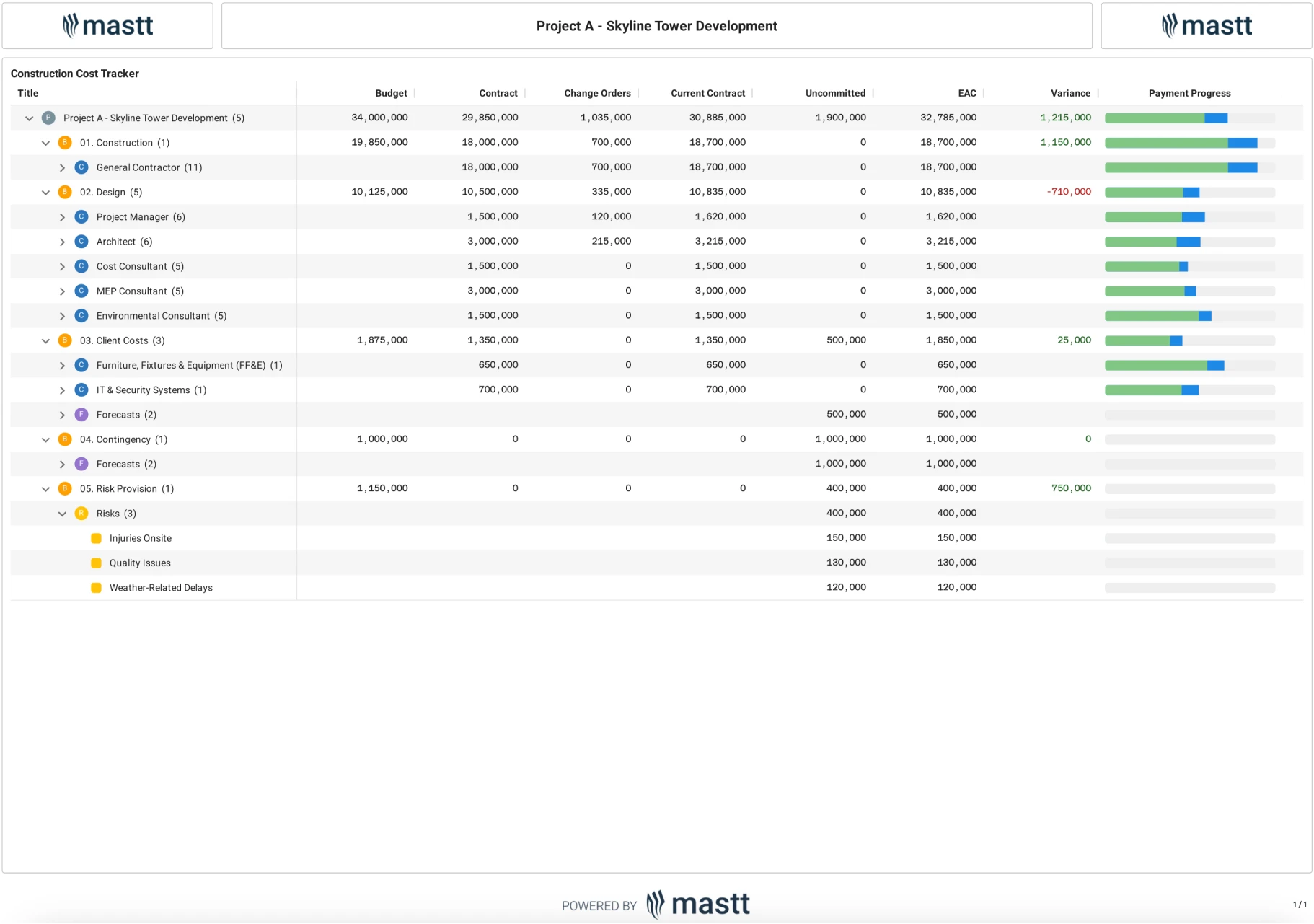What is a Construction Cost Breakdown Template?
A construction cost breakdown template is a ready-to-go format used to list every cost item in a construction project. It typically includes cost codes, descriptions of work, estimated and actual costs, committed amounts, and forecast-to-complete figures.
A Construction Cost Breakdown Template helps track where money is being spent across labor, materials, equipment, and overheads. It often includes columns for changes, payments to date, and remaining budgets, making it easier to manage budgets against scope.
A Smarter Way to Build Your Construction Cost Breakdown
You can create your full construction cost breakdown directly in Mastt’s Cost Module. No more wrestling with spreadsheets or stitching together reports from multiple sources. Everything you need to understand, manage, and report on costs lives in one intelligent, real-time dashboard.
With Mastt’s Cost Module, you can:
🚀 See the full picture with integrated registers: Budgets, contracts, variations, payments, risks, and forecasts are all connected in Mastt’s digital registers. The ‘Overall’ view gives you instant visibility into total cost performance, committed spend, and financial health.
🎯 Drill down to what matters: Expand rows to explore detailed budget and contract data. Use filters, custom columns, and work breakdown structures to focus on key scope items, cost codes, or risks, whatever matters most for your decision-making.
⚡️ Track cost performance without the admin load: Create sub-budgets, add variations, and process payments with one click. Mastt links everything, so your cost breakdown updates automatically as your project evolves.
Forget about building cost breakdowns from scratch. With Mastt’s Cost Module, they’re already built in, clear, live, and ready for action.
How to Use Mastt’s Cost Module for Construction Cost Breakdown
Managing construction costs doesn’t have to be complex. With Mastt’s Cost Module, you can build a complete, real-time cost breakdown that connects budgets, contracts, variations, payments, and forecasts, all in one place.
Here’s a step-by-step guide to building and managing your construction cost breakdown in Mastt:
1. Create Budgets and Sub-Budgets
Start by setting up your overall project budget. Then break it down into sub-budgets to reflect trades, packages, cost codes, or scope areas. This structure gives you precision and visibility across every part of your project.
2. Link Contracts to Budgets
Once your budgets are in place, add contracts and connect each line item directly to one or multiple budgets or cost codes. This creates a clear link between planned and committed costs, making variance analysis seamless.
3. Manage Variations and Payments
Log variations as they’re approved and process payments with a single click. Mastt automatically updates the current contract value and payment progress, so your cost data stays accurate and audit-ready.
4. Track Risks and Uncommitted Costs
Bring in cost-related risks directly from Mastt’s Risk Module. Add uncommitted amounts for future scope, provisional sums, or potential changes. This gives you a more complete view of what’s coming and what could shift.
5. Monitor Variance in Real Time
Compare budgets against actuals, committed costs, and forecasts to spot overruns before they happen. Mastt calculates variances automatically so you can stay in control of financial performance.
6. Drill into the Details
Click into any row to see detailed breakdowns by contract, line item, or budget category. This helps you uncover what’s driving cost changes and make decisions backed by real data.
7. Customise Your View
Filter by cost type, pin critical columns, and reorder data to suit your workflow. Mastt lets you shape your cost view to highlight what matters most for your role or reporting needs.
8. Visualise with Built-In Charts
Use Mastt’s out-of-the-box visualisations to view committed, uncommitted, risk, and contingency costs. No need to build graphs - just open the chart and present your data.
💡 Pro Tip: Mastt makes every one of these steps faster and easier. It’s purpose-built for construction projects, so you can manage your construction cost breakdown without the spreadsheet chaos.

What’s Included in a Construction Cost Breakdown Template?
A construction cost breakdown template includes the key details that help you stay ahead of budget blowouts and funding delays. When stakeholders ask where the money’s gone, this is what gives you answers with clarity, structure, and confidence.
Here’s what the Mastt’s template for construction cost breakdown include:
- Title or Cost Grouping: Organized by major cost areas like Construction, Design, Contingency, and Risks. You can expand each group to see detailed line items, right down to individual consultants or work packages.
- Budget: Your original approved budget for each item. This sets the baseline for tracking financial performance.
- Contract: The contract value awarded to vendors or contractors. Pulled directly from your linked contract records.
- Change Orders: All approved variations are captured here, so you always know how much scope (and cost) has shifted.
- Current Contract: The sum of original contract plus change orders, your actual commitment to date.
- Uncommitted Cost: The portion of your budget not yet tied to a contract. Mastt shows this clearly, so you know what’s still available.
- EAC (Estimate at Completion): A live forecast of total expected cost, combining current commitments with remaining projections.
- Variance: Automatically calculated difference between budget and EAC. Positive? You’re under. Negative? You’ll see it flagged instantly.
- Payment Progress: Visual bars that show how much has been paid, approved, or is still pending, so you’re never guessing where cash flow stands.
Each field is there to make cost tracking easier to manage. You get more clarity, better decisions, and fewer surprises.

Why Use a Template for Construction Cost Breakdown
When you're juggling budgets, shifting scopes, and tight deadlines, it’s easy to lose track of where the money’s actually going. A template for construction cost breakdown gives you clarity when you need it most.
- Improves cost visibility: Every cost is tracked by category, so you can see exactly what’s been spent, what’s committed, and what’s left in the budget.
- Supports approvals and funding: Clear breakdowns make it easier to justify budgets, raise changes, and get payments approved faster.
- Reduces risk of overruns: By comparing estimates, commitments, and actuals in one view, teams can spot cost pressures early and take action before it’s too late.
- Standardizes cost tracking: Using a consistent format helps teams work together across multiple projects. It ensures every cost follows the same logic, no matter who’s managing it.
- Saves time on reporting: With a ready-made structure, project teams spend less time formatting spreadsheets and more time using the data to make decisions.
Who Should Use a Construction Cost Breakdown Template
A construction cost breakdown template is for anyone who needs to stay in control of construction finances. It’s built for clear reporting, accurate forecasting, and faster decision-making.
You should use a template for a construction cost breakdown if you’re a:
✅ Project manager tracking budgets, forecasts, and actual costs across complex scopes. The breakdown keeps you ahead of issues and supports smarter decisions in real time.
✅ Cost planner or quantity surveyor responsible for estimating and value management. The template helps structure estimates, change orders, and financial progress by cost code.
✅ Contractor or subcontractor managing claims, variations, and committed costs. A breakdown ensures everything lines up with contracts, so nothing gets missed.
✅ Construction company running multiple projects. Standardised templates improve consistency across teams and make it easier to scale cost tracking.
✅ Client-side PM or owner’s representative needing transparent cost reports for approvals, funding, or board reviews. A cost breakdown builds trust and reduces back-and-forth.
Common Problems with Manual Templates
Manual templates might work on day one. But as your project moves forward, they often become a liability. Here’s what typically goes wrong:
❌ Scattered data: Costs live in separate Word docs, Excel spreadsheets, Google Sheets, and inboxes. Pulling it all together takes time and still risks missing critical numbers.
❌ No real-time visibility: Templates don’t update themselves. By the time you spot a cost issue, it’s already escalated.
❌ Disconnected from contracts and payments: Manual templates rarely link to live contract values, claims, or payment schedules. This leads to duplicated work and outdated info.
❌ Difficult to scale: Tracking one project manually is hard enough. Multiply that across a portfolio, and it becomes unmanageable.
❌ Inconsistent formats: Different teams fill in templates in their own way. Without standardisation, you lose accuracy and slow down reporting.
❌ No audit trail: Changes to numbers aren’t tracked. If something goes wrong, it’s hard to explain or defend.
❌ Hidden overruns: Without alerts or built-in checks, cost blowouts stay hidden until they hit your bottom line.
Go Beyond Templates. Build Smarter with Mastt.
Manual templates can only take you so far. When your project needs real-time visibility, connected data, and less admin, it’s time to move beyond static files.
With Mastt’s Cost Module, you can create a live construction cost breakdown that tracks budgets, contracts, variations, and payments, all in one place.
👉 Use Mastt’s Cost Module to build your cost breakdown today. Live data, instant clarity, and full control over your project financials.








